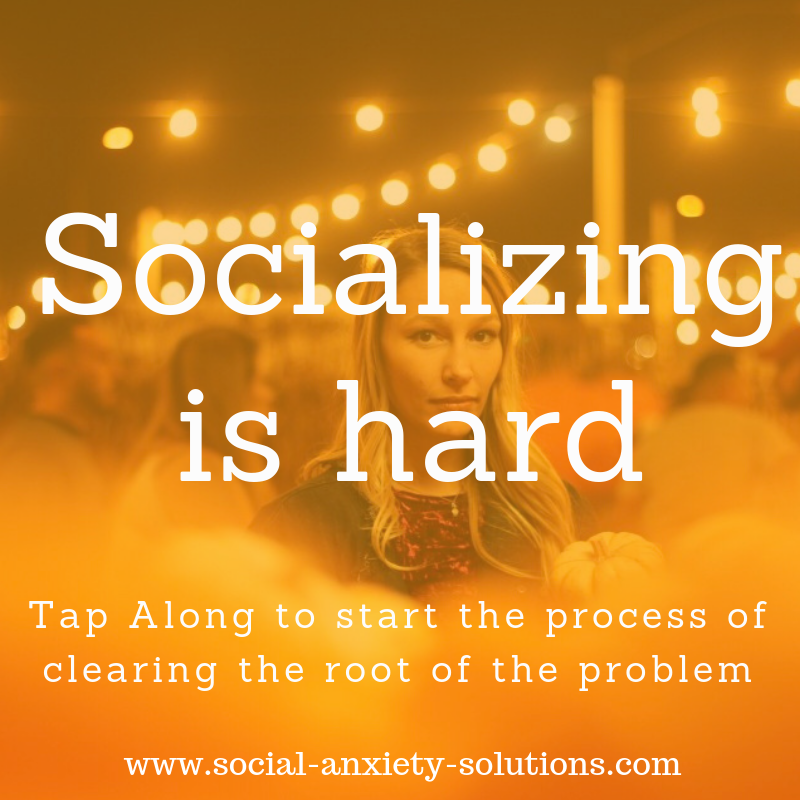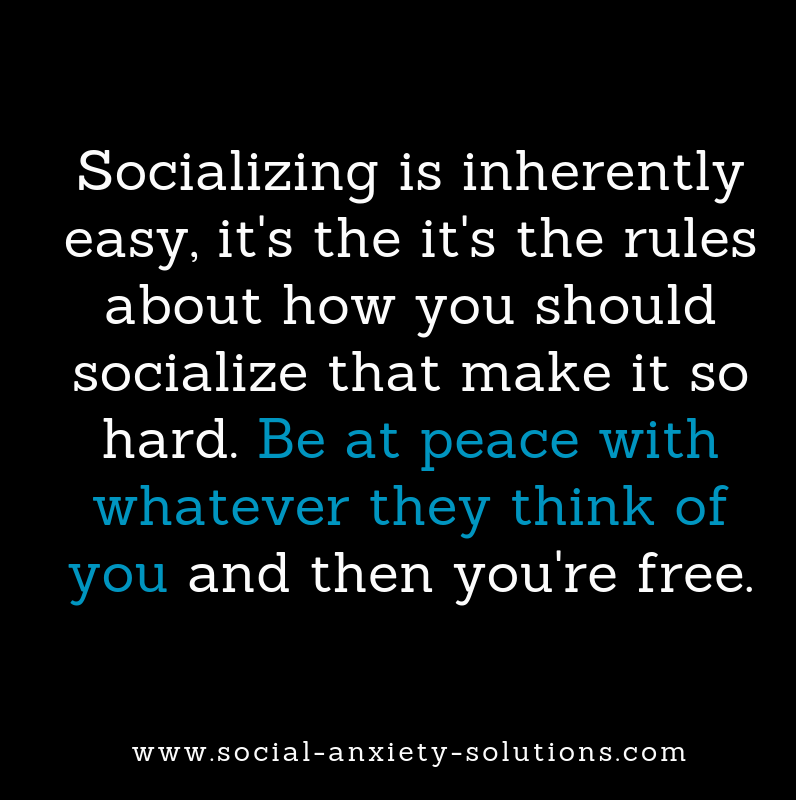SUMMARY
In this post, I’m addressing something I hear all the time…
“Socializing is hard”.
I want to give you some perspective on the idea of socializing and share how you can use tapping to address the emotions tied to the problem.
You can start to feel more safe socially once you have this perspective and once you start taking action.


FULL TRANSCRIPTION
Sebastiaan: Hello, this is Sebastiaan from social-anxiety-solution.com. I am the creator of the social confidence community and I run a podcast on iTunes called “Social Anxiety Solutions” where I interview best-selling authors, psychologists, coaches, healers, psychotherapists, PhD’s researchers for their best social anxiety solutions. You can find a podcast on my website as well.
Now in these videos that I release every week I tackle a particular topic every week and this week I’m covering the following topic “Socializing is hard and difficult”.
I’ve just come up from a session with a client and that was one of the concerns. And what we’re going to do is we’re going to do a bit of tapping on that idea and that belief but before we do that, I first want to tell you what tapping is very briefly and also give you a bit of perspective on socializing itself.
So, first of all real quick what is tapping? I’m doing it right now. I’m tapping on my face and body if you’ve never seen this looks really weird looks really bizarre but it’s amazingly effective. There are more than 100 peer-reviewed studies have shown the effectiveness of this technique, it goes by the name of EFT that’s the official name for it which stands for Emotional Freedom Techniques.
It’s a psychological form of acupuncture but instead of using needles you take the tip to your fingers and you tap on specific acupressure points in the body. When you’re doing that while you’re focusing on particular problem then the emotions connected to that problem start to dissolve release and neutralize.
And since your social anxiety is actually an emotional problem, which is by the way the reason why just changing your thoughts and forcefully facing your fears is not going to give you the permanent results that you’re looking for most likely. Since social anxiety is an emotional problem the tapping is very effective for that, okay? So, that’s tapping.
But the idea that I heard from my client which isn’t a new idea at all, I heard all the time is that socializing is difficult and hard. And you know what? That’s true and it’s not true as well.
Alright. So, let’s first look at why someone might believe that to be true. Alright, if you would have asked me 10 years ago, 15 years ago associate is socializing hard I would say it’s very hard, it’s difficult, it’s impossible, got a do it right, there’s so much pressure etc. Because then I was still suffering from social anxiety and that colored my social experience.
So, a lot of people that believe that socializing is hard and difficult they’re judging how hard or not hard it is through the lens of their social anxiety. So, they’re in a social situation and because their brain is perceiving danger, they feel anxiety as a result of it. And when that anxiety is going on their heart is racing fast, there’s a lump in their throat, there’s an upsetness in their stomach, their brain is scanning for potential danger, all these things that could go wrong. They feel stiff, you can properly relate to this, you’re afraid you’re going to get judged, you’re worried about saying the wrong thing, you’re running out of things to say, you got sad etc. Like all of this is going on.
Now because all of this is going on your whole system is in survival mode. Yes, then socializing is not just hard it’s nearly impossible. It’s very difficult. You’re the part of the brain called the amygdala has activated the fight flight freeze response. Your body’s biologically built in a response to threats to danger.
And so, your whole system is in survival mode. So, your system is saying there is a danger run the hell from it the hormones in your body are optimizing your body to be able to run as fast as you possibly can or to fight the danger if you can as hard as you can or to freeze and play dead if you can’t do either, okay?
So, that’s what’s going on when you’re feeling socially anxious. And part of that fight flight freeze response is it takes the blood away from your head and away from your digestive system into your outer limbs to prepare your body for fighting or running.
And so, in that moment you can’t be funny, you can’t think on your feet, you don’t have access to your intelligence, you can’t stay focused and just relax, look someone in the eyes, connect and just be present in the moment because there’s a threat and your system is like run, hide, fight. So, yes, it’s true that in those situations socializing is really difficult and really hard, okay?
Alright, so that’s true. Now let’s look at the other side when is socializing actually not hard.
Well, socializing isn’t hard when there’s no anxiety, okay? Duh, right. It’s a bit of a duh answer but let me explain it. So, you develop a particular insecurity as you go about your life social anxiety starts to happen because your brain is perceiving threats and that threat might be a very common one “I’m afraid that I’ll be judged or I’m afraid that I’ll be rejected or I’m afraid they won’t like me or I’m afraid they’ll criticize me. I’m afraid they’ll put me down, I’m not good enough, they won’t like me” blah, blah, blah.
All of that stuff is going on which and these are the lenses through which you look at people around you in social situations and as a result your brain is like a “There’s a potential threat here – Careful, careful, careful, careful, careful, careful, danger!”
And since all of that is going on it’s very hard and difficult to socialize but what are these beliefs and what are these fears?
Well, a lot of them are actually rules about how you should be and how you shouldn’t be socially, and it becomes more and more rigid how you can operate in a social situation.
And so, people if you’re anxious you’re going to be super alert, for example, if you’re afraid to get rejected you become hypersensitive to the slightest forms of rejections. It just how your brain works. And you will become super good at trying to avoid it.
So, what are you gonna do?
Well, that pain that rejection is super painful so you’re gonna your brain is gonna create all these ways of behaving to avoid that so people-pleasing, not saying no when you should say no because it’s true for you you’re no, I’m not stepping on anyone’s toes, not ever saying anything offensive holding things back that actually come to mind that you want to say but hey, what if someone gets upset or what if you get you come the center of attention and so on.
And you start to really adjust your behavior in order to avoid that rejection in any and all ways possible, so you then come up with all these rules about social behavior.
So, for example, “I should always look good. I can’t upset anyone. I have to avoid being the center of attention. I should always look cool. I can never look nervous. I have to avoid awkwardness. It’s bad if there’s an awkward situation, I have to be interesting, I have to be the funniest, I have to be the coolest”. Blah, blah, blah, blah. And all these rules make you even more anxious, right?
So, when you’re at a place of being at ease socially you still have the preference to be liked, you still have the preference of avoiding awkward situations, who cares? But it’s not a need anymore, alright?
So, all these rules that are hard and fast rules just become preferences. When I’m out socially I prefer to people like me, but I don’t need them to like me. They don’t like me that doesn’t change anything in my emotional state. You see what I mean? See what the difference is there?
So, there’s a need it’s like “Oh, please, please like me because if you don’t I feel really bad about myself and I need you to like me or hey I’m I already like myself and I be nice if you like me too if not, that’s okay, maybe you’re having an off day or maybe you just got resigned or you come out of a crappy relationship or it’s that time in a month or whatever”. Right?
It’s not something personal or rather it’s not something that you take something so personal if you keep in power on the inside.
So, socializing actually is super easy. It’s supposed to be effortless. Why? Because if you allow yourself to make mistakes, if you allow yourself to look dumb, if you allow yourself to be in awkward situations, if you don’t blame yourself for awkward situations, if you’re okay with people not liking you, if you don’t take yourself so seriously in other words if you’re just okay with you and you like you and you’re at peace with whatever they think of you give them an unlimited pass for judging you in whatever way they can then you’re free man then it’s a good time.
So, socializing is inherently easy, effortless, but it’s the it’s the rules about how you should socialize that make it so hard.
Anyway, it’s quite a long story to make a point but I think it’s an important point and I don’t think I’ve ever talked about that before so here we go. And I want to do a little bit of tapping and you can follow along with to cement in this mindset.
Alright, so, it’s gonna be super easy. There are different ways of doing tapping I say tapping more often than I say EFT because EFT has a particular specific kind of formula and I deviate from that quite a bit. So, just like I’m gonna do now, so let’s just call it tapping. So, it’s very simple. If this is the first time you see this simply follow along do what I do tap where I tap say what I say. It is that easy.
Tap-Along
Alright, so, good. So, we need to take you to fingers tap at the beginning of your eyebrows right here and just repeat it up to me out loud say “Socializing is really hard and difficult”. Side of the eyes, “And I can’t do it”.
Under the eyes, “I suck at it”.
Under the nose, “I’ve always been bad at it especially in those kinds of situations”. You know what I’m referring to.
Collarbone, “I just can’t socialize”.
Under the arms, if you’re a guy, if you work if you were to wear a bra in the unlikely event it’s directly under your armpit where the bra strap meets directly on your armpit. If you’re a lady that’s where it is as well. Alright so just say “I can’t socialize”.
Liver point, “It’s impossibly difficult”.
Wrist point, “And I hate it”.
Top of the head, “I don’t want to socialize”.
Beginning of the eyebrows, “It’s like rocket science to me”.
Side of the eyes, “It’s extremely difficult”.
Under the eyes, “And I’ll never be able to do it”.
Under the nose, “Or at least that has been my experience”.
Chin, “And I sucked many times”.
On the collarbone, “And I’m not socially suave”.
Under the arms, “I’m not the kind of person that easily socializes”.
On the liver point “And maybe that’s for a reason”.
Wrist point, “Because when I’m around other people and I feel anxious”.
Top of the head, “My whole system is in survival mode”.
Beginning of the eyebrows, “And I’m scanning for danger, so I can avoid them”.
Side of the eyes, “And my whole system is busy doing that”.
Under the eyes, “And it does that because it tries to protect me”.
Under the nose, “Because survival is more important than being funny or very interesting or cool.”
Chin, “To my system it’s life or death”.
On the collarbone, “And I’ve judged my social skills”.
Under the arms, “On times that I’ve been socially anxious”.
Liver point, “But there have been moments in my life”.
Wrist point, “Where I spend some time with someone, I was more comfortable with”.
Top of the head, “And surprisingly the more comfortable I am the better my social skills”.
On the beginning of the eyebrows, “What if socializing is only hard because of my anxiety?”
On the side of the eyes, “What if when I feel relaxed and at ease”.
Under the eyes, “And it doesn’t matter what I say”.
Under the nose, “And it matters, and it doesn’t matter what I don’t say”.
Chin, “And I judge everything that comes out of my mind out of my mouth as perfectly fine”.
Collarbone, “It’s effortless”.
Under the arms, “Maybe when making a mistake socially is okay”.
Liver point, “And I don’t have to do it perfectly”.
Wrist point, “And I like myself regardless of whether they accept me or not.”
Top of the head, “Socializing isn’t hard”.
Beginning of the eyebrows, “What if it isn’t my social skills that have been the problem”.
Side of the eyes, “But instead it’s been the beliefs that I’ve had that are the problem.”
Under the eyes, “And my beliefs are just emotionalized thoughts”.
Under the nose, “Thoughts or ideas if which I have evidence to prove their validity”.
Chin, “So, if I believe that I’m not good enough”.
Collarbone, “I’ve had experiences in the past that taught me that I’m not good enough”.
Under the arms, “There was painful emotional experiences”.
Liver point, “Maybe it’s been my dad that was always critical of me and so I learned it”.
Wrist point, “Maybe I experienced something else”.
Top of the head, “But it’s my beliefs that caused the perception of danger”.
Being if the eyebrows, “I’m open to the possibility”.
Side of the eyes, “As I shift and change these beliefs”.
Under the eyes, “Socializing is not as hard as I thought”.
Under the nose, “I’m open to it being easier than I thought”.
Chin, “I want to be more comfortable with myself”.
Collarbone, “What if I accepted myself and bit by bit started to find ways to like myself”. Under the arms, “Because when I’m okay with me”.
Liver point “I’m going to anticipate others being okay with me too”.
Wrist point, “And I can become more and more okay with me as I do this work”.
Top of the head, “I can take small steps every day”.
Good job, deep breath and relax. Alright. So, I hope it’s been helpful. Actually, I teach you how to do that in the free course that I have on my website, it’s called “The social confidence starter kit” presuming it’s still the same kit when you see this video and in there you get 10 free videos, 5 of them actually guide you through the basics of this technique so you know how to do it for yourself and I’m 5 of them I guide you through some tapping as we just did to shift some of your feelings and shift some of your emotions.
And I had a comment once from a guy who said that just with those 10 videos, he cleared 40% of his social anxiety and that is free ladies and gentlemen, yes, it is.
Alright, and it also comes with a 20-page eBook where I explain how I overcame my social anxiety and the 4 steps to create rock-solid social confidence. Social ease is really it, but social confidence just sounds sexier.
Anyway, I hope it’s been helpful. You can go to my website to get that now at social-anxiety-solutions.com. Thank you, bye for now.
Oh, and you can subscribe here or there or there or there. I release a video like this every Thursday. Thanks, bye.
If you experience Social Anxiety, click below to receive the FREE “7 Secrets to Social Confidence” Mini Course!
- How To Stop Worrying - January 17, 2024
- How to Reduce Facial Blushing with EFT Tapping? - June 29, 2023
- Are You Scared to Get Anxious? Here’s how to fix it! - June 16, 2023


